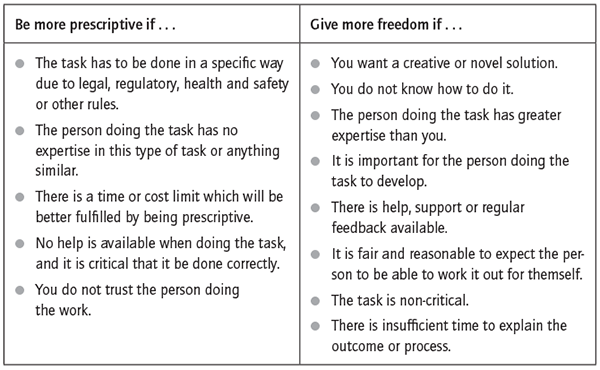This chapter contains checklists to manage others’ work. Project success depends on the project manager’s ability to direct the project team members to do the project activities.
Defining tasks and setting objectives for others
The starting point for getting anyone else to do a task is to define what you want. This checklist contains key points to consider when defining a task.
- Define the nature of the task. Think how you like things explained to you. You should be able to answer the following questions before you try to explain it to others:
- What is the task?
- Why does this task need to be done?
- How important is the task? What priority is it?
- What are the constraints on doing it (is there a time limit, can anyone else be asked for help, is there a budget, etc.)?
- Can the task be done in any way, or must it follow a defined process or be done in a specific way?
- How will you judge whether it has been successfully completed or not?
- Are there any expectations or requirements about the outcome that need to be spelled out?
- Are there any rewards for doing the task?
- Having defined the task, check understanding by asking the person doing it to describe back to you what they should be doing. Correct any mistakes in their understanding.
- Agree when you will get back together.
- If it is a simple task that the person doing it is familiar with, then you don’t need to see them until they have completed it.
- If the task is more complex, or is of a type that the person doing is unfamiliar with, agree times for checkpoints to assess progress and ensure the outcome will meet your needs. (See page 30.)
In asking someone to do a task you can prescriptively define how it is to be done, or you can give leeway to interpret what is required. Generally, it is good to be less prescriptive and to be open to an individual’s creativity. This often results in a better solution and enables the individual to develop. Being continuously prescriptive indicates you either have poor management skills or have the wrong team!
There are no hard rules, and the following table lists factors to consider in making a decision about how prescriptive to be.

Understanding skills and resources needed for a task
What skills or knowledge are required?
- What technical or specialist knowledge is needed?
- Are formal qualifications required – is this a task that must be done by someone who has a recognised accreditation?
- Is this a task one person can do on their own, or does it require interacting with many others? If so, what interpersonal skills are needed?
- Does the task need any management skills?
- Is position or power important to completing this task?
- Is the ability to be creative helpful?
- Is knowledge of the business and environment essential or helpful – or is it better if the person doing the work is free from preconceived ideas?
- Is any other task-specific skill or knowledge needed?
What human resources are required?
- How big or complex is the task?
- How much time is available to complete the task?
- How quickly is it required?
- Can it be broken down into pieces? How? As a result, how many people could work on this in parallel?
- Can any of the work be outsourced or contracted out? Do you have a budget for this?
Other resources required?
- What other resources are required (e.g., consumables, infrastructure, facilities, tools, IT systems, etc.).
- Are these available? If not, can you source them?
Choosing the right person to do a task
Being successful in projects is not just about allocating work to team members, it’s also about choosing the right person for each task. Factors in choosing the right person to do the work are:
- Is there a choice of person? If there is:
- Who has the most capacity to do the work?
- Who is the most reliable person with this type of work?
- What are the levels of motivation among the available people?
- Who has the skills or knowledge to do the work?
- Is it more important to get the task done right or quickly?
- Is it important to expand the skills in a business, department or team, or reduce dependency on scarce resources?
- What support is needed, and how does this affect the choice of person?
- How much time or help from you or another skilled professional is available to support this task?
- How much time do you have available to oversee or manage the task?
- How much help or support will the different people who could do the task need?
- What is the impact and what is your contingency plan should the person chosen fail to complete the work to the necessary level of quality?
- How likely is it that the person chosen will not do the work, or will do it incorrectly?
- Can you regularly check progress to decrease this likelihood?
- Who could take over or help deliver the task, if necessary?
Checking progress
Keeping track of progress gives confidence that work is being done on time, and provides the opportunity to assist the person doing the work. The following table provides guidance on how to check progress and how often.
| Issue | Implications for progress checking |
| Has the person doing the task fed back a clear understanding of what you require, and agreed to do this? | Get this understanding and agreement. |
| If not possible, have more, regular progress checks. | |
| Have you agreed when you will meet to assess progress? | As part of task definition, agree when you will review progress and what you expect to see. |
| Are you happy with the approach and outcome the person doing the work is proposing? | If not, make clear what changes you expect. |
| Is the task fully defined, or are you expecting some creativity or exploration of options as part of the work? | If you require the use of initiative, plan early checkpoints, when there is enough time to adapt if what is being done is not what is wanted. |
| How do you assess progress with this task? | Ensure you have a way of understanding what progress is being made. |
| Is the person an expert with greater knowledge than you? | Fewer, shorter checkpoints are required. |
| If you are the expert, ensure you have time to provide help and support. | |
| Do you lack confidence in the person’s ability or motivation to complete the task? | Plan early checkpoints, when there is enough time to adapt if what is being done is not what is wanted. |
| Have you agreed when you will next meet to discuss progress? | Always agree when you will meet next. If the person’s work did not meet expectations, meet again soon. |
Helping someone else to complete a task
With delegation comes a responsibility to provide help and support. Tips to providing help are:
- Be open to requests for help. It’s you who needs the task done, and it’s you who will suffer if it’s done badly.
- Listen to the request. Make sure you really understand what help is needed, and don’t jump to conclusions as to what to do.
- Try to get the requester to ask specific questions. It’s far easier to answer a specific question, even if it is as big as ‘I don’t know how to get started’.
- Try not to do the work for them. Help them to work out what they need to do rather than do it for them. Ask questions like ‘What could be a better way?’ or ‘Can you see an alternative approach?’ rather than tell them how to do it.
- From time to time offer support without being asked. People remember team members and managers who actively support them, and you will get better results.
- If they really can’t understand, and time is pressing – get someone else to do the work. But only do this if you must! Remember: doing this often is a management failure as you chose the wrong person, and did not help them to develop.
Managing tasks across a team
Sometimes tasks are best done by several people. This can speed delivery times but can make the management of the task a little more complex. If the task is being split:
- Ensure it makes sense to break the tasks into different pieces (some work cannot be broken down).
- Clarify who you are expecting to do what. If you want the team to decompose the task into different pieces themselves, make this clear.
- Ensure there are no gaps and overlaps between the activities the task is broken into.
- If you think the team members will not work constructively together, make one person a team leader responsible for resolving disputes.
- Ensure it is clear who pulls the different pieces of work together into one final deliverable. Although the work is broken down you will usually want one output, not several.
- Clarify when and how you would like the team to come to you for review, feedback or to escalate any problems that arise which the team cannot resolve.
Getting someone to do a task when you aren’t their line manager
This is a common challenge for project managers. Factors to consider when getting someone, who does not work for you, to do a task:
- Ask nicely! Don’t treat every request as a confrontation. Use your influencing skills. Asking for support in the right way makes it more likely that you will get the help you need.
- Ask confidently and don’t appear apologetic. It is quite reasonable to ask people to do work for you. It is their responsibility to say no if they cannot.
- Choose the time to ask. There are times when it’s far easier to get help than not. For example, asking an accountant for help at month-end is less likely to get a positive response than asking in the middle of the month.
- Don’t accept the first no. Always try a little persuasion.
- Be willing to negotiate. If the person does this task, show what the benefit for them is. This does not have to be a reward, but can be something trivial such as ‘I will be really pleased’, ‘You will have the opportunity to impress the sponsor ’, etc.
- Explain the importance of the work. Most people are reasonable and will help out with important tasks.
- See if there is something you can do for them in return. This can be small, but important to them. ‘If you do this, I’ll make sure the boss knows what a great help you’ve been.’
- If possible, ask their line manager for support. ‘I want to get x to do y – can you support me?’
- Escalate to your project sponsor if you are getting nowhere, but don’t do this too often. (See page 115.)
- If you struggle to get others to do work for you, find someone you know who always manages to get things done by other people. What do they do that you don’t?
And when someone has done some work for you well, remember to thank them. Saying thanks goes a long way, and you may be asking them for help again soon!
All projects, even the largest and most complex, depend on individuals completing their assigned activities. The fundamental management skills in any situation are the abilities to select the most appropriate people, to define tasks and set objectives, and to monitor progress and provide appropriate help.



